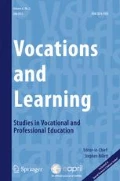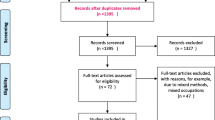Abstract
Relational aspects of professional practice demand increasing attention in research on work and learning. However, little is known about how knowledge is enacted in practices where different people work together. Working in partnership with clients surfaces a number of epistemic demands, responses to which are poorly understood. This paper analyses two cases of nurses working with parents in support services for families with young children. The questions asked are: What epistemic practices are enacted when professionals work in partnership with clients? How do they generate distinct modes of partnership work? Findings show how professionals’ and clients’ knowledge is mobilised and made actionable through practices of diagnostic reasoning, recontextualising, testing and contesting knowledge claims. A distinction is presented between partnership that unfolds as strengthening the client from a professional epistemic perspective, and that which validates and augments the client’s own epistemic contribution. This reveals how knowledge is made to matter and becomes a basis for action in the course of working with others, and informs a new analytical distillation highlighting key epistemic aspects of professional-client partnership.
Similar content being viewed by others
Notes
Partnership can also be used to refer to relationships at a broader level, as in Billett et al.’s (2007) study of social partnerships. Our focus is on partnership as an interpersonal rather than inter-sectoral or inter-organisational accomplishment.
Sophie’s practices had features that some may note resonate with aspects of Solution Focused Brief Therapy, Systemic Therapy, or other approaches.
References
Aarsand, L. (2014). The knowledgeable parenting style: Stance takings and subject positions in media encounters. International Journal of Lifelong Education, 33(5), 625–640. https://doi.org/10.1080/02601370.2014.909895.
Avdi, E., & Georgaca, E. (2007). Discourse analysis and psychotherapy: A critical review. European Journal of Psychotherapy & Counselling, 9(2), 157–176. https://doi.org/10.1080/13642530701363445.
Billett, S., Ovens, C., Clemans, A., & Seddon, T. (2007). Collaborative working and contested practices: Forming, developing and sustaining social partnerships in education. Journal of Education Policy, 22(6), 637–656. https://doi.org/10.1080/02680930701625288.
Cunningham, C. M., & Kelly, G. J. (2017). Epistemic practices of engineering for education. Science Education, 101(3), 486–505. https://doi.org/10.1002/sce.21271.
Damşa, C. & Nerland, M. (2016). Student learning through participation in inquiry activities: two case studies in teacher and computer engineering education. Vocations and Learning, 9(3), 275-294. https://doi.org/10.1007/s12186-016-9152-9.
Day, C., Ellis, M., & Harris, L. (2015). Family partnership model reflective practice handbook. London: Centre for Parent and Child Support for South London and Maudsley NHS Foundation Trust and King's College London.
Edwards, A. (2010). Being an expert practitioner: The relational turn in expertise. Dordrecht: Springer.
Edwards, A., Daniels, H., Gallagher, T., Leadbetter, J., & Warmington, P. (2009). Improving inter-professional collaborations: Multi-agency working for children's wellbeing. London: Routledge.
Eriksson, I., & Lindberg, V. (2016). Enriching ‘learning activity’ with ‘epistemic practices’: Enhancing students’ epistemic agency and authority. Nordic Journal of Studies in Educational Policy, 2. https://doi.org/10.3402/nstep.v2.32432.
Eronen, R., Pincombe, J., & Calabretto, H. (2010). The role of child health nurses in supporting parents of young infants. Collegian, 17, 131–141. https://doi.org/10.1016/j.colegn.2010.04.001.
Evetts, J. (2014). The concept of professionalism: Professional work, professional practice and learning. In S. Billett, C. Harteis, & H. Gruber (Eds.), International handbook of researching professional and practice-based learning (pp. 29–56). Dordrecht: Springer.
Fenwick, T. (2012a). Coproduction in practice: a sociomaterial analysis. Professions & Professionalism, 2(2). https://doi.org/10.7577/pp/v2i1.323.
Fenwick, T. (2012b). Learning among older professional workers: Knowledge strategies and knowledge orientations. Vocations and Learning, 5(3), 203–223. https://doi.org/10.1007/s12186-012-9074-0.
Fowler, C., Rossiter, C., Bigsby, M., Hopwood, N., Lee, A., & Dunston, R. (2012). Working in partnership with parents: The experience and challenge of practice innovation in child and family health nursing. Journal of Clinical Nursing, 21(21–22), 3306–3314. https://doi.org/10.1111/j.1365-2702.2012.04270.x.
Gartmeier, M., Bauer, J., Gruber, H., & Heid, H. (2008). Negative knowledge: Understanding professional learning and expertise. Vocations and Learning, 1(2), 87–103. https://doi.org/10.1007/s12186-008-9006-1.
Gherardi, S. (2006). Organizational knowledge: The texture of workplace learning. Oxford: Blackwell.
Grundmann, R. (2017). The problem of expertise in knowledge societies. Minerva, 55(1), 25–48.
Guile, D. (2010). The learning challenge of the knowledge economy. Rotterdam: Sense Publishers.
Guile, D. (2011). Interprofessional activity in the ‘space of reasons’: Thinking, communicating and acting. Vocations and Learning, 4(2), 93–111. https://doi.org/10.1007/s12186-011-9052-y.
Guile, D. (2014). Professional knowledge and professional practice as continuous recontextualisation. In M. Young & J. Muller (Eds.), Knowledge, expertise and the professions (pp. 78–92). Abingdon: Routledge.
Harris, L., Wood, L., & Day, C. (2014). An ethnographic study into the family partnership model: Implementation and sustainability. London: Centre for Parent and Child Support / South London and Maudsley NHS Foundation Trust.
Hopwood, N. (2016). Professional practice and learning: times, spaces, bodies, things. Dordrecht: Springer.
Hopwood, N. & Clerke, T. (2016). Professional pedagogies of parenting that build resilience through partnership with families at risk: a cultural-historical approach. Pedagogy, Culture & Society, 24(4), 599-615. https://doi.org/10.1080/14681366.2016.1197299.
Hopwood, N. (2017a). Agency, learning and knowledge work: epistemic dilemmas in professional practices. In M. Goller & S. Paloniemi (Eds.), Agency at work: an agentic perspective on professional learning and development (pp. 121-140). Dordrecht: Springer.
Hopwood, N. (2017b). Expertise, learning, and agency in partnership practices in services for families with young children. In A. Edwards (Ed.) Working relationally in and across practices: cultural-historical approaches to collaboration (pp. 25-42). Cambridge: Cambridge University Press.
Hopwood, N. & Edwards, A. (2017). How common knowledge is constructed and why it matters in collaboration between professionals and clients. International Journal of Educational Research, 83, 107–119. https://doi.org/10.1016/j.ijer.2017.02.007.
Jensen, K., Lahn, L. C. & Nerland, M. (2012). Professional learning in the knowledge society. Springer Science & Business Media.
Jensen, K., Nerland, M., & Enqvist-Jensen, C. (2015). Enrolment of newcomers in expert cultures: an analysis of epistemic practices in a legal education introductory course. Higher Education, 70(5), p 867. https://doi.org/10.1007/s10734-015-9872-z.
Juhila, K., Hall, C., & Raitakari, S. (2016). Interaction during mental health floating support home visiting: Managing host-guest and professional-client identities in home-spaces. Social & Cultural Geography, 17(1), 101–119. https://doi.org/10.1080/14649365.2015.1042401.
Knorr Cetina, K. (2001). Objectual practice. In T. R. Schatzki, K. Knorr Cetina, & E. von Savigny (Eds.), The practice turn in contemporary theory (pp. 175–188). London: Routledge.
Knorr Cetina, K. (2006). Knowledge in a knowledge society: Five transitions. Knowledge, Work and Society, 4(3), 23–41.
Knorr Cetina, K., & Reichmann, W. (2015). Professional epistemic cultures. In I. Langemeyer, M. Fischer, & M. Pfadenhauer (Eds.), Epistemic and learning cultures at the university of the 21st century (pp. 18–33). Weinheim: Beltz Juventa.
Markauskaite, L., & Goodyear, P. (2014). Professional work and knowledge. In S. Billett, C. Harteis, & H. Gruber (Eds.), International handbook of researching professional and practice-based learning (pp. 79–106). Dordrecht: Springer.
Markauskaite, L., & Goodyear, P. (2016). Epistemic fluency and professional education: Innovation, knowledgeable action and working knowledge. Dordrecht: Springer.
Mattila, A. (2001). Seeing things in a new light: Reframing in therapeutic conversation (Rehabilitation Foundation research report 67). Rehabilitation Foundation: Helsinki.
Nerland, M. (2008). Knowledge cultures and the shaping of work-based learning: the case of computer engineering. Vocations and Learning, 1(1), 49-69. https://doi.org/10.1007/s12186-007-9002-x.
Nerland, M. & Jensen, K. (2014). Changing cultures of knowledge and professional learning. In S. Billett, C. Harteis & H. Gruber (Eds.), International handbook oif researching professional and practice-based learning (pp. 611-640). Dordrecht: Springer.
Prior, L. (2003). Belief, knowledge and expertise: The emergence of the lay expert in medical sociology. Sociology of Health & Illness, 25(3), 41–57.
Säljö, R. (2009). Learning, theories of learning, and units of analysis in research. Educational Psychologist, 44(3), 202–208. https://doi.org/10.1080/00461520903029030.
Schön, D. (1987). Educating the reflective practitioner: Toward a new design for teaching and learning in the professions. San Francisco: Jossey-Bass.
Shaffer, D. W. (2006). Epistemic frames for epistemic games. Computers & Education, 46(3), 223–234. https://doi.org/10.1016/j.compedu.2005.11.003.
Smith, J., Swallow, V., & Coyne, I. (2015). Involving parents in managing their child's long-term condition – A concept synthesis of family-centered care and partnership-in-care. Journal of Pediatric Nursing, 30(1), 143–159. https://doi.org/10.1016/j.pedn.2014.10.014.
van Houte, S., Bradt, L., Vandenbroeck, M., & Bouverne-De Bie, M. (2015). Professionals' understanding of partnership with parents in the context of family support programmes. Child & Family Social Work, 20(1), 116–124. https://doi.org/10.1111/cfs.12067.
Acknowledgements
The research was funded by the Australian Research Council (DE150100365], and approved by The study was approved by South Western Sydney Local Health District Research and Ethics Office (HREC/15/LPOOL/77) and by the University of Technology Sydney HREC (2015000284). The authors wish to thank the staff and clients of Karitane, Tresillian and Northern Sydney Local Health District for their participation.
Author information
Authors and Affiliations
Corresponding author
Rights and permissions
About this article
Cite this article
Hopwood, N., Nerland, M. Epistemic Practices in Professional-Client Partnership Work. Vocations and Learning 12, 319–339 (2019). https://doi.org/10.1007/s12186-018-9214-2
Received:
Accepted:
Published:
Issue Date:
DOI: https://doi.org/10.1007/s12186-018-9214-2




